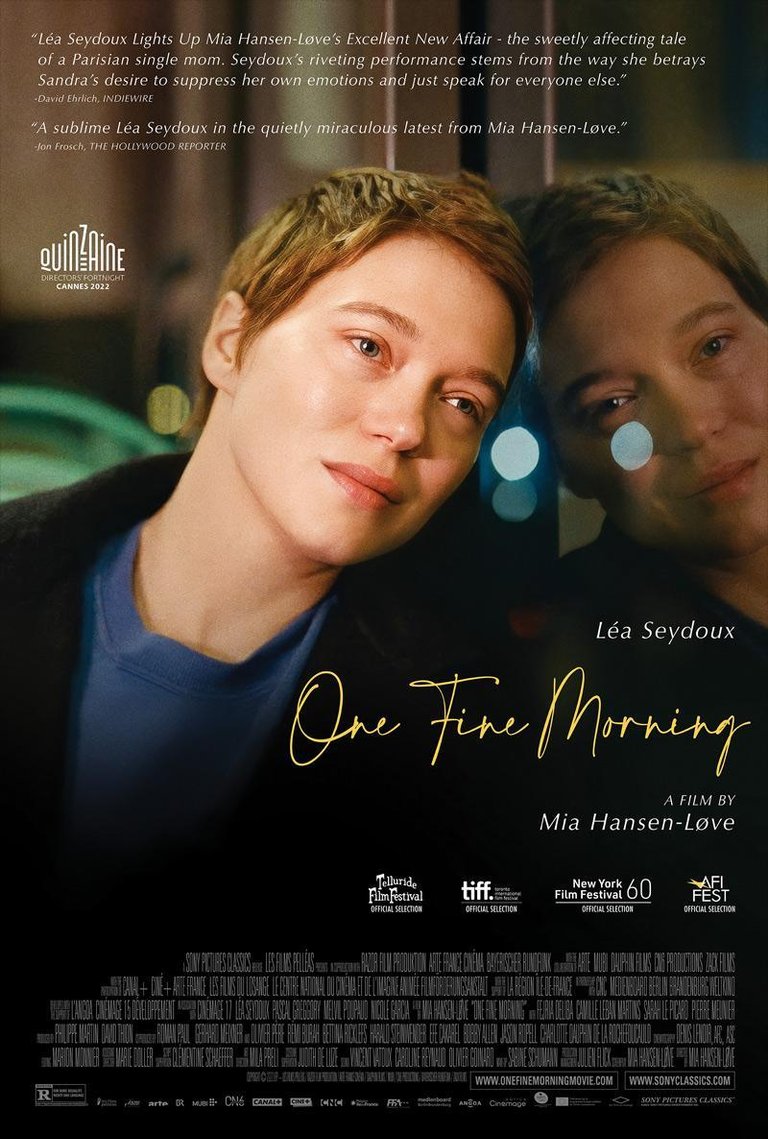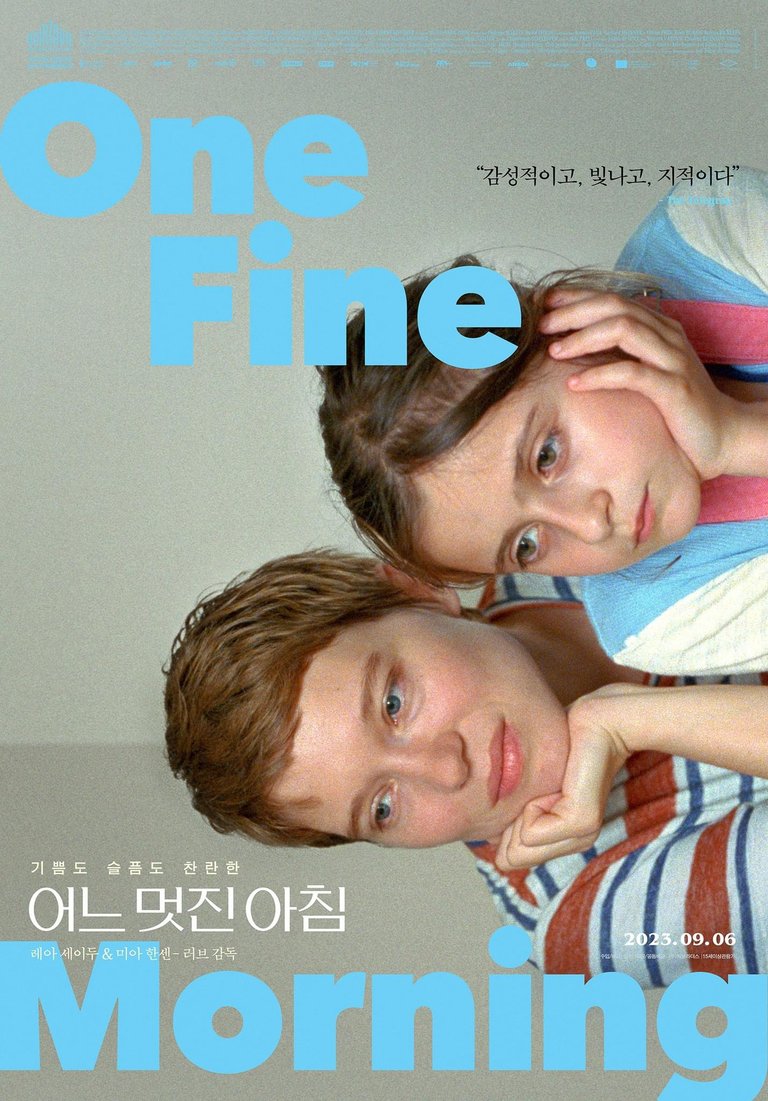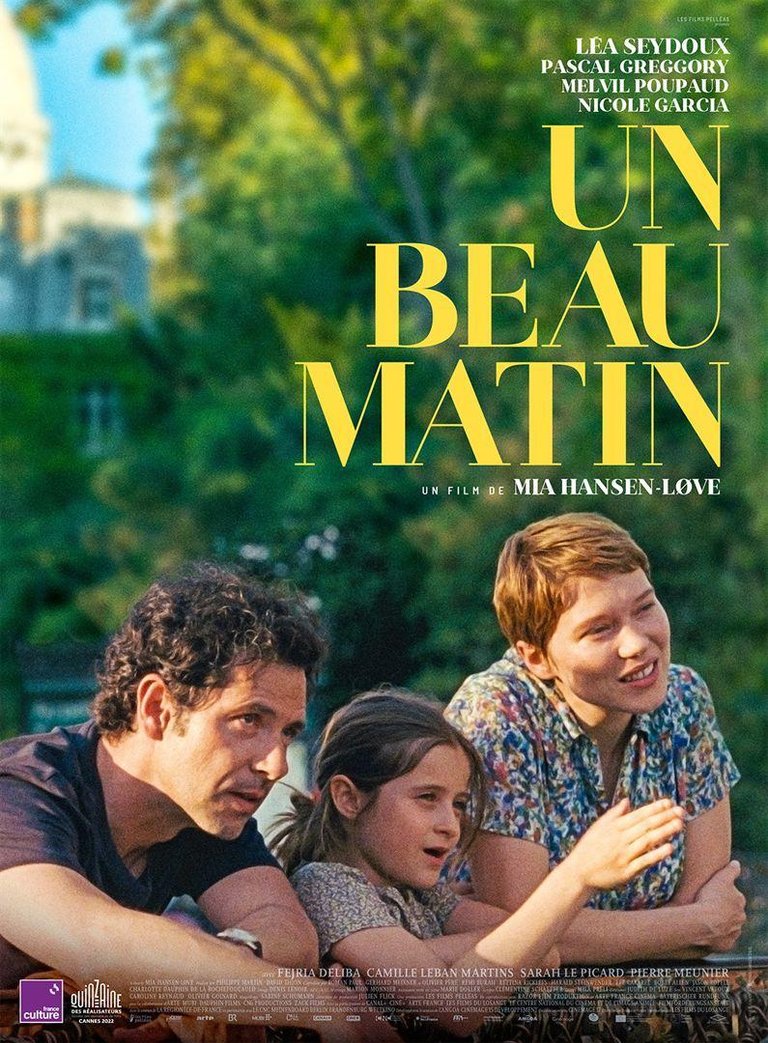One Fine Morning (2022): as life itself | como la vida misma

Although I prefer dramatic films, those where there are wars or deep existential conflicts, moral dilemmas, black and white scenes and stories probably coming from some remote corner of the planet, from time to time it also provokes me to see a light, more everyday story. And simple. A few days ago I was in precisely this mood when I came across a movie called One Fine Morning and I said to myself "ok, that sounds like what I'm looking for"; I sat down to watch it and the truth is that the title is a little misleading.
Si bien prefiero las películas dramáticas, esas en donde hay guerras o conflictos existenciales profundos, dilemas morales, escenas en blanco y negro e historias probablemente provenientes de algún rincón remoto del planeta, de vez en cuando también me provoca ver alguna historia ligera, más cotidiana y sencilla. Hace algunos días me encontraba precisamente en este ánimo cuando di con una película llamada One Fine Morning y me dije "ok, suena como lo que estoy buscando"; me senté a verla y la verdad es que el título es un poco engañoso.
Let's see, this French film written and directed by Mia Hansen-Løve and starring Léa Seydoux (who has appeared in many films and played great roles as a Bond girl, as the girl with blue hair in La vie d'Adele and even played a character in Dune: Part Two) is a romantic drama that touches on other quite delicate topics. The story begins with Sandra (Seydoux), a woman who works as a translator and lives with her daughter Linn, about eight or nine years old. There is no father figure in the home, so the first thing we think is that Sandra is a single mother. However, we don't have time to dwell on this issue because we immediately meet Sandra's father, who lives alone in an apartment and suffers from a neurodegenerative disease that is inevitably leading him to dependency on permanent assistance. Sandra talks with her sister and their mother (who is not her father's current partner because they both divorced years ago and have new partners) and between the three of them they decide to look for a halfway decent nursing home, good enough for them. trustworthy, but economical enough to be able to afford it. It is a difficult decision, but necessary and just on those same days, when Sandra is making these arrangements, she meets Clément, an old friend of hers who works as a scientist and who has traveled to remote places.
A ver, esta película francesa escrita y dirigida por Mia Hansen-Løve y protagonizada por Léa Seydoux (que ha aparecido en muchos films e interpretado grandes papeles como una chica Bond, como la chica del cabello azul en La vie d'Adele y hasta salió en Dune: Part Two) es un drama romántico que toca otros temas bastante delicados. La historia inicia con Sandra (Seydoux), una mujer que trabaja como traductora y vive con su hija Linn, de unos ocho o nueve años. No hay figura paterna en el hogar, así que lo primero que pensamos es que Sandra es madre soltera. Sin embargo, no nos da tiempo de darle muchas vueltas a ese asunto porque de inmediato conocemos al padre de Sandra, quien vive solo en un departamento y padece una enfermedad neurodegenerativa que lo está conduciendo inevitablemente a la dependencia de una asistencia permanenente. Sandra conversa con su hermana y con la madre de ambas (que no es la actual pareja de su padre porque ambos se divorciaron hace años y tienen nuevas parejas) y entre las tres deciden buscar un hogar de ancianos medianamente decente, lo suficientemente bueno que les de confianza, pero lo suficientemente económico para poder pagarlo. Se trata de una decisión difícil, pero necesario y justo en esos mismos días, en que Sandra está haciendo esas gestiones, se encuentra con Clément, un viejo amigo suyo que trabaja como científico y que ha viajado a lugares remotos.

In that first conversation we understand several things that take us from one emotional extreme to another. Because Clément seems nice and if Sandra doesn't have a partner... something may arise; but then we found out that Sandra is alone because she's a widow, Clément knew her husband and he himself is in a relationship for years that has given him two wonderful girls... so we thought that, well, Sandra could use someone to talk to and support her during these difficult times.
En esa primera conversación entendemos varias cosas que nos llevan de un extremo emocional a otro. Porque Clément parece agradable y si Sandra no tiene pareja... algo puede surgir; pero entonces nos enteramos de que Sandra está sola porque es viuda, Clément conocía al marido de ella y además él mismo se encuentra en una relación de años que le ha dado dos maavillosas niñas... así que pensamos que, bueno, que también le vendría bien a Sandra alguien con quien hablar y que la apoye en esos tiempos difíciles.
But Sandra is young, sweet and beautiful and that revives certain feelings that Clément always had towards her. Somewhat vulnerable, alone and in need of affection, Sandra also develops romantic feelings towards Clément so they both embark on an affair that, although it has the positive side of caresses, kisses, the connection between two people who love and desire each other, It also has the less kind side of remorse and guilt. When talking about it, they both feel that it's not a simple adventure, but will Clément be able to abandon his wife and daughters to live with Sandra and Linn? Will Sandra allow him to do it? If he is truly in love with Sandra and not his wife, is it okay for him to pursue his happiness with her? Or is the right thing to honor his marriage and forget about Sandra? In these cases, can we speak of a right decision? As you can see, it's a dramatic situation that, added to the whole issue of Sandra's father's illness, causes her - and those of us who see her - strong and painful emotions, which leads us to think, Where is the One Fine Morning from the title? However, the story is well written and believable and very real. These are things that can happen and actually do happen. People get sick, die, become widowed, fall in love again, give up things, pursue others, and regardless of one thing or another, for better or worse, life goes on. This is a film that feels as real as life itself.
Pero Sandra es joven, dulce y hermosa y eso hace que revivan ciertos sentimientos que Clément siempre tuvo hacia ella. Algo vulnerable, sola y necesitada de afecto, Sandra también desarrolla sentimientos románticos hacia Clément así que ambos se embarcan en un affair que si bien tiene el lado positivo de las caricias, los besos, la conexión entre dos personas que se quieren y se desean, también tiene el lado menos amable de los remordimientos y la culpa. Al conversarlo, ambos sienten que no se trata de una simple aventura, pero ¿será capaz Clément de abandonar a su esposa y a sus hijas para vivir con Sandra y Linn? ¿Sandra permitirá que lo haga?, si verdaderamente está enamorado de Sandra y no de su esposa, ¿está bien que persiga su felicidad al lado de ella? ¿o lo correcto es honrar su matrimonio y olvidarse de Sandra? En estos casos, ¿se puede hablar de una decisión correcta? Como lo ven, se trata de una situación dramática que sumada a todo el tema de la enfermedad del padre de Sandra le provoca a ella - y a quienes la vemos - emociones fuertes y dolorosas, lo que nos lleva a pensar, ¿Dónde está la One Fine Morning del título? Sin embargo, la historia está bien escrita y resulta verosímil y muy real. Son cosas que pueden pasar y que de hecho, pasan. La gente enferma, se muere, enviuda, se enamora nuevamente, renuncia a cosas, persigue otras, y sin importar una cosa u otra, para bien o para mal, la vida sigue. Se trata de una película que se siente tan real como la vida misma.

Although most of Autumn's interventions are short and sharp phrases, she expresses herself at all times through her eyes and gestures. You can see and feel the fear, the disappointment, the rage, the shame, everything, in her face and that is not a minor merit for such a young actress who embodied very well the character constructed wonderfully by Eliza Hittman, who also did an incredible job conceiving and creating the atmosphere of the entire film.
Me gustó bastante el guión, no sólo por las cosas que ocurren en la historia sino por las palabras que se usan para describir ciertos sentimientos y aunque la trama principal pareciera ser la relación romántica entre Sandra y Clément, la parte que más me dejó reflexiones y frases para pensar fue la relación de Sandra con su padre y la condición de este último.
There is a scene in which Sandra talks about how she recognizes her father more in his bookshelf than in the body she sees in the asylum, because in those books is his spirit, his intelligence, his legacy and, in the end, his life. Linn tells her mother that Grandpa didn't write those books, how could he be in them?, to which her mother explains that the titles were selected by him, each of those books were loved, read and preserved by a specific reason and in that collage of titles and authors are the pieces that make his father the person he is. That scene, that dialogue, seemed beautiful to me, because although objects are just things, when we lose someone, our desire to keep their belongings does not only have to do with the object itself but with that idea that Sandra explained in the film, it's like keeping a little piece of that someone. That one scene is already worth the 112 minutes that the film lasts, so I think that One Fine Morning, despite that somewhat misleading title (the film explains the reason for that title and I liked that explanation, but of course, when you have not seen any synopsis and you read those three words, it is logical that one expects something else) it's a good movie, with its share of drama, romance, laughter, tenderness, anguish and many other emotions that have we ever had, which means that - although our situation is not exactly that of the protagonists - we can empathize with their feelings. Have any of you seen this movie? I read you in the comments.
Hay una escena en la que Sandra habla de cómo reconoce más a su papá en su biblioteca (en la de él) que en el cuerpo que ve en el asilo, porque en esos libros está su espíritu, su inteligencia, su legado y, en fin, si vida. Linn le dice a su madre que el abuelo no escribió esos libros, ¿cómo podría estar en ellos?, a lo que su madre le explica que los títulos fueron seleccionados por él, cada uno de esos libros fueron amados, leídos y conservados por una razón específica y en ese collage de títulos y autores están las piezas que hacen de su padre la persona que es. Esa escena, ese diálogo, me pareció hermoso, porque si bien los objetos son sólo cosas, cuando perdemos a alguien, nuestro deseo de conservar sus pertenencias no tiene que ver solamente con el objeto en sí sino con esa idea que Sandra explicó en la película, es como quedarnos con un pedacito de ese alguien. Esa única escena ya vale los 112 minutos que dura la película, así que creo que One Fine Morning, a pesar de ese título medio engañoso (en el film se explica el por qué de ese título y me gustó esa explicación, pero claro, cuando no se ha visto ninguna sinopsis y se leen esas tres palabras, es lógico que uno espere otra cosa) es una buena película, con sus cuotas de drama, romance, risas, ternura, angustia y muchas otras emociones que alguna vez hemos tenido, lo que hace que - aunque nuestra situación no sea exactamente la de los protagonistas - podamos empatizar con sus sentimientos, ¿alguno de ustedes ha visto esta película? Los leo en los comentarios.
Reseñado por @cristiancaicedo
Other posts that may interest you | Otros posts que pueden interesarte:
 |
|---|




No he visto ese filme. Gracias por tu reseña de él, que se muestra de sumo interés, por las complejas relaciones humanas que aborda; al parecer, según tu opinión, de un modo serio y respetuoso. Saludos, @cristiancaicedo.